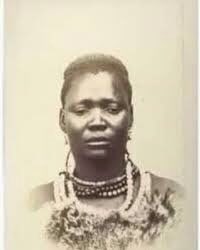 Southern African History
Southern African History Queen Mantatisi (1781–1836):
She was the daughter of Chief Mothaba of the Basia people in what later became the Harrismith district of the Free State province of South Africa, was reportedly a tall, attractive woman.
She married Mokotjo, the chief of the neighboring Batlokwa, in a typical dynastic alliance, and is said to have borne him four sons. Mokotjo died while the heir, Sekonyela, was still too young to assume the chieftaincy, so Manthatisi acted as regent for Sekonyela.
After Mokotjo's death the Tlokwa faced military encroachments by the AmaHlubi people who were fleeing their homes in neighboring Natal. Made refugees themselves, Manthatisi commanded the Tlokwa into the Caledon Valley, driving out other Sotho communities living there.
Her troops seized the crops and cattle of the people they attacked, leaving a trail of destruction and devastation.
Her reign of military conquest extended as far as central modern day Botswana.
Her reign of military conquest extended as far as central modern day Botswana.
At the height of her military & political power her army was estimated to contain 40 thousand fighters. However, she eventually suffered a series of defeats beginning in Bechuanaland in January 1823. Peter Becker describes the developments during this period when he states that:
"Meanwhile Mmanthatisi was approaching with forty thousand men, women and children. It was January 1823, the time of the year crops were ripening and food was usually plentiful. But the Wild Cat People were compelled to live frugally, for so great had been the chaos brought....
about by lifaqane in general and the plundering of Mmanthatisi, Mpangazita and Matiwane in particular that entire tribes had vanished from their settlements even before they had tilled their fields in preparation for planting.
Indeed, the Central Plateau swarmed with hunger-stricken stragglers and small, detached parties of bandits. Apart from roots, bulbs and berries, there was little food to be found in the veld, certainly not enough to feed so large a horde as that of Mmanthatisi."
Nonetheless, the most prosperous of the Bechuana chiefs, Makaba of the Bangwaketsi, made a firm decision not to surrender to Mmanthatisi without a struggle. The same above-mentioned author, Peter Becker, continues by saying that:
"Meanwhile, the old Chief had decided not to surrender to Mmanthatisi without a fight. He called up every available warrior, garrisoned every pass leading to his capital, and with the guile for which he was famous, prepared traps into which he planned to lead his aggressors.
"Since her flight from the Harrismith District Mmanthatisi had managed to brush aside all opposition in the territories she traversed, but now in the stifling bushveld of Bechuanaland she was to come face to face with a foe whose fighting forces were as numerous as,
and also better fed than, those of the Wild Cat People. The vanguard of Mmanthatisi's army strode into ambuscades; large groups of men topped headlong into concealed pitfalls and met their death beneath volleys of barbed javelins.
A battle broke out, in the course of which hundreds of the invaders were massacred. Before the situation could develop into a rout Mmanthatisi suddenly disengaged her armies and retreated with her hordes to the east.
Thus Makaba became the first Sotho chief to repulse the formidable Wild Cat Army, and to this day he is spoken of as the 'Man of Conquest.'"
Because Of Manthatisi’s notoriety, all Sotho-Tswana raiders became known as “boo-Mmanthatisi”, or Mantatee Horde” by the English. Known also as the “Destroyer of Nations”, she was only stopped from entering the Cape Colony by British Forces near Aliwal North.
Eventually Manthatisi settled her people on the Marabeng Mountains.
Although portrayed as an evil woman by some contemporary Europeans, she was a strong, capable and popular leader, both in war and peace.
Although portrayed as an evil woman by some contemporary Europeans, she was a strong, capable and popular leader, both in war and peace.
Her popularity is clearly indicated by the fact that instead of her people being known as Tlokwa,they became known as ‘ Manthatisi’. Unlike other chiefs who fell victim to the Difaqane wars, she successfully kept her people together in the midst of frequent raids by Nguni people.

 Read on Twitter
Read on Twitter


